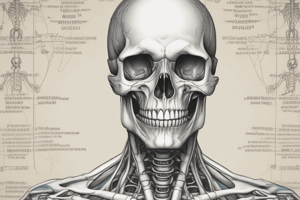Podcast
Questions and Answers
Which of the following statements is correct about Cartilaginous joints?
Which of the following statements is correct about Cartilaginous joints?
- They are found only in the skull.
- They are held together by cartilage and have no joint cavity. (correct)
- They have a synovial cavity.
- They are freely movable joints.
Which part of a synovial joint is responsible for reducing friction between articulating surfaces?
Which part of a synovial joint is responsible for reducing friction between articulating surfaces?
- Articular capsule
- Joint cavity
- Accessory ligaments
- Articular cartilage (correct)
Which joint type allows for rotation around a single axis?
Which joint type allows for rotation around a single axis?
- Hinge joint
- Pivot joint (correct)
- Ball-and-socket joint
- Condyloid joint
What type of injury is a torn meniscus an example of?
What type of injury is a torn meniscus an example of?
Which of the following features is commonly associated with osteoarthritis?
Which of the following features is commonly associated with osteoarthritis?
Which of the following movements is primarily allowed by a ball-and-socket joint?
Which of the following movements is primarily allowed by a ball-and-socket joint?
What is the primary function of a bursa?
What is the primary function of a bursa?
Which of the following supplies nutrients to the articular cartilage?
Which of the following supplies nutrients to the articular cartilage?
Which functional classification best describes joints that are slightly movable?
Which functional classification best describes joints that are slightly movable?
What type of injury does a dislocation represent?
What type of injury does a dislocation represent?
Which type of joint is the temporomandibular joint (TMJ)?
Which type of joint is the temporomandibular joint (TMJ)?
What two structures define the temporomandibular joint?
What two structures define the temporomandibular joint?
What movements occur at the TMJ?
What movements occur at the TMJ?
Flashcards are hidden until you start studying
Study Notes
Joints: Structure and Function
- Cartilaginous joints are held together by cartilage and do not have a joint cavity.
- Synovial joint articular cartilage reduces friction between articulating surfaces.
- Pivot joint allows movement around a single axis.
- Torn meniscus is an example of cartilage damage.
- Osteoarthritis is characterized by bone spur formation due to cartilage deterioration.
- Ball-and-socket joint allows for rotation and circumduction.
- Bursa functions to reduce friction between moving structures.
- Synovial fluid supplies nutrients to the articular cartilage.
- Amphiarthrosis is the classification for joints that are slightly movable.
- Dislocation occurs when bones are forced out of normal position in the joint.
Temporomandibular Joint (TMJ)
- Type: Hinge/Planar
- Structures: Condylar process of the mandible and Mandibular fossa of the temporal bone
- Movements: Protraction/Retraction and Depression/Elevation
Studying That Suits You
Use AI to generate personalized quizzes and flashcards to suit your learning preferences.



